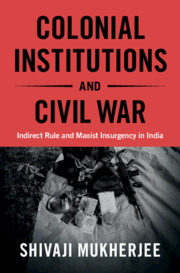Book contents
- Colonial Institutions and Civil War
- Cambridge Studies in Contentious Politics
- Colonial Institutions and Civil War
- Copyright page
- Contents
- Figures
- Tables
- Acknowledgments
- Part I Theory
- 1 Colonial Institutions and Civil War
- 2 Legacies of Colonial Indirect Rule: Weak State, Ethnic Inequality, and Insurgency
- 3 Varieties of Indirect Rule and Causal Pathways to Maoist Insurgency in India
- Part II Qualitative and Quantitative Testing
- Part III Generalizability
- Bibliography
- Index
- Series page
1 - Colonial Institutions and Civil War
from Part I - Theory
Published online by Cambridge University Press: 15 May 2021
- Colonial Institutions and Civil War
- Cambridge Studies in Contentious Politics
- Colonial Institutions and Civil War
- Copyright page
- Contents
- Figures
- Tables
- Acknowledgments
- Part I Theory
- 1 Colonial Institutions and Civil War
- 2 Legacies of Colonial Indirect Rule: Weak State, Ethnic Inequality, and Insurgency
- 3 Varieties of Indirect Rule and Causal Pathways to Maoist Insurgency in India
- Part II Qualitative and Quantitative Testing
- Part III Generalizability
- Bibliography
- Index
- Series page
Summary
A fundamental question remains unanswered by theorists of civil war—do colonial institutions play a role in creating conditions for insurgency? In contrast to the scholarship on civil wars which tend to focus on proximate causes of rebellion, this book proposes that many insurgencies around the world -- in Colombia, Sri Lanka, Burma, Nigeria -- have origins in deep historical processes. Bringing history back into the study of civil wars can provide a deeper understanding of the roots of some insurgencies. It can also explain the persistence of conflict which theories of civil war that focus on more proximate determinants cannot. I outline the case of the Maoist insurgency in India, which exemplifies how different forms of colonial indirect rule and indirect revenue collection created land and ethnic inequalities that persisted and created the conditions for rebellion. Analysis of this case has lessons for the long-term legacies of historical institutions for insurgency and allows us to address endogeneity and explain recurrence of conflict. I outline several contributions of my theory to the literature on colonial legacies and political violence in South Asia, and describe the mixed methods nested analysis research design in the book.
Keywords
- Type
- Chapter
- Information
- Colonial Institutions and Civil WarIndirect Rule and Maoist Insurgency in India, pp. 3 - 25Publisher: Cambridge University PressPrint publication year: 2021



